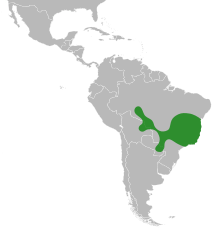Cyclolobium brasiliense (Brazil: louveira, cabruitinga, mucitaíba; Paraguay: ysypó copi) is a species of flowering plants in the legume family, Fabaceae. It belongs to the subfamily Faboideae. It is native to Bolivia, Brazil, and Paraguay and is the only member of the genus Cyclolobium.[1][2][3]
| Cyclolobium | |
|---|---|
| Scientific classification | |
| Kingdom: | Plantae |
| Clade: | Tracheophytes |
| Clade: | Angiosperms |
| Clade: | Eudicots |
| Clade: | Rosids |
| Order: | Fabales |
| Family: | Fabaceae |
| Subfamily: | Faboideae |
| Tribe: | Brongniartieae |
| Genus: | Cyclolobium Benth. |
| Species: | C. brasiliense
|
| Binomial name | |
| Cyclolobium brasiliense Benth.
| |

| |
| The range of Cyclolobium brasiliense | |
| Synonyms[1] | |
| |
References
edit- ^ a b Warwick MC, Pennington RT (2002). "Revision of Cyclolobium (Leguminosae: Papilionoideae)". Edinburgh J Bot. 59 (2): 247–257. doi:10.1017/S0960428602000069.
- ^ "ILDIS LegumeWeb entry for Cyclolobium". International Legume Database & Information Service. Cardiff School of Computer Science & Informatics. Retrieved 21 February 2014.
- ^ USDA; ARS; National Genetic Resources Program. "GRIN species records of Cyclolobium". Germplasm Resources Information Network—(GRIN) [Online Database]. National Germplasm Resources Laboratory, Beltsville, Maryland. Archived from the original on 24 September 2015. Retrieved 21 February 2014.
Data related to Cyclolobium at Wikispecies